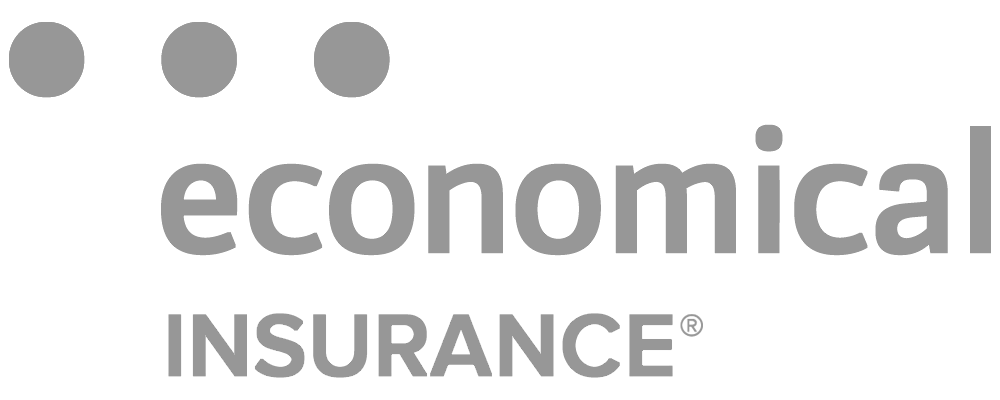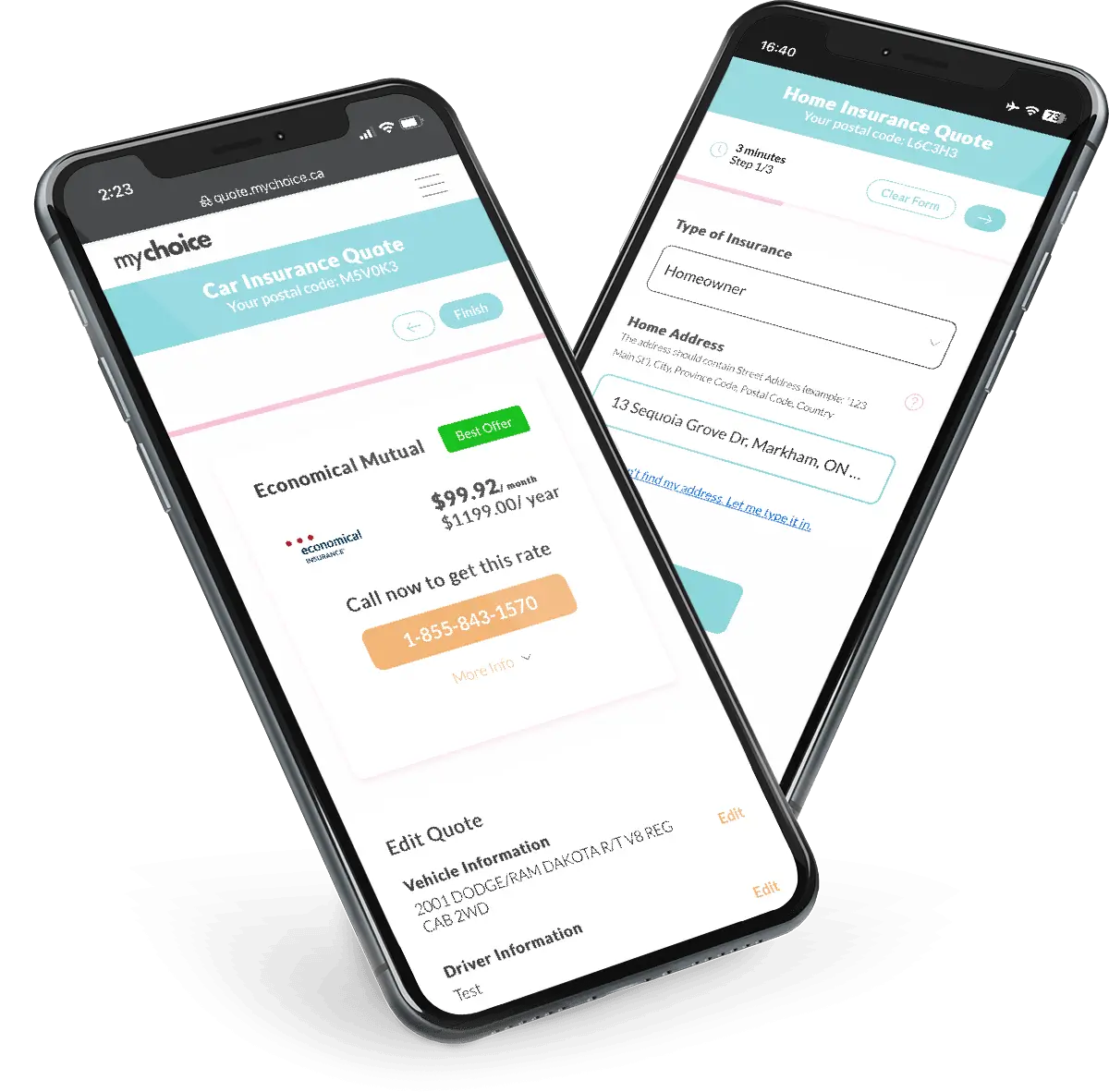Quote data from MyChoice.ca, November 2025
How Can You Get Cheap Car Insurance in New Brunswick?
The best way to get cheap car insurance in New Brunswick is to find the lowest-priced policies and reduce your risk profile, landing you more affordable premiums. Here’s how you can find the best insurance policy deals:
Who Provides Car Insurance Quotes in New Brunswick?
Insurance brokers, agents, aggregators, and direct writers provide car insurance quotes in New Brunswick. While they all offer auto insurance, they specialize in different things. Here’s a quick look at each insurance provider type:
How Does Car Insurance Work in New Brunswick?
Car insurance in New Brunswick works like typical car insurance policies. The insurer provides financial coverage if you get involved in an auto accident. Car insurance is mandatory for all drivers in New Brunswick, which means you may face legal consequences if you drive without a policy.
If you’re caught driving uninsured in New Brunswick, you’ll be fined between $207 and $5,187. You may also face other punishments like jail time or licence suspensions.
Here’s a breakdown of the key components of car insurance in New Brunswick:
How Your Car Insurance Quotes Are Calculated in New Brunswick
New Brunswick insurers use several factors to calculate your car insurance rates. Here’s a look at what factors influence your New Brunswick auto insurance rates:
Most Expensive Cities to Insure a Car in New Brunswick
The average car insurance rate in New Brunswick is $792/year, which makes it the third-cheapest province for auto insurance. However, different cities can have different car insurance rates, which means you may encounter higher-than-average rates in some cities in the province.
Here’s a detailed look at the most expensive cities for car insurance in New Brunswick:
| City | Average Annual Insurance Premium |
|---|---|
| Moncton | $942 |
| Fredericton | $859 |
| Saint John | $859 |
Quote data from MyChoice.ca, November 2025
Car Insurance Cost in New Brunswick by Age
New Brunswick auto insurance premiums fluctuate depending on your age. People under 25 usually pay more for insurance due to their inexperience. Similarly, people over 65 also pay more premiums because their accident risk increases.
Here’s a look at car insurance premiums in New Brunswick by age:
| Age Group | Average Cost | Annual Savings With My Choice |
|---|---|---|
| 18-20 | $2,825 | $562 |
| 21-24 | $1,614 | $322 |
| 25-34 | $1,077 | $214 |
| 35-44 | $792 | $158 |
| 45-54 | $649 | $129 |
| 55-64 | $552 | $110 |
| 65+ | $629 | $126 |
Quote data from MyChoice.ca, November 2025
Car Insurance Cost in New Brunswick by Driving History
Insurers check your driving history to determine auto insurance rates to predict future driving behaviour. Having traffic violations on your record may make them think you’re a high-risk driver and charge you accordingly.
Depending on the severity and frequency of your traffic violations, you can pay many times over the average New Brunswick auto insurance rate as a bad driver. Here’s a quick look at how a bad driving record influences your auto insurance premiums:
| Driving violation | Average annual car insurance rate |
|---|---|
| Clean driving record | $792 |
| Insurance cancellation due to non-payment | $1,298 |
| Licence suspension for alcohol-related offences | $949 |
| One accident | $1,741 |
| Speeding ticket | $1,028 |
Quote data from MyChoice.ca, November 2025
New Brunswick Car Insurance Trends
The average car insurance rate in New Brunswick fluctuates often. According to the Groupement des Assureurs Automobiles (GAA), the average car insurance rate in the province declined from 2010 to 2014, then started rising sharply from 2015 to 2019. Between 2015 and 2019, the average auto insurance rate in New Brunswick rose by $180.
Fortunately, the average rate went down again in recent years. From the $942/year we saw in 2019, the average auto insurance rate fell to the current $763/year, which makes New Brunswick one of the cheapest provinces for car insurance in Canada.
Other Factors That Affect Car Insurance Prices in New Brunswick
Insurers calculate your auto insurance rates based on many factors. Here are some additional things that could influence your New Brunswick car insurance rates:
Main Mode of Commuting in New Brunswick
Cars, trucks, and vans are the most popular modes of commuting in New Brunswick, with 269,215 out of 292,725 of the province’s total commuters taking private vehicles to work. Of the 92% commuter share, 83.9% are drivers, while the remaining 8% are passengers.
Pedestrians come at a distant second, with just a 4.2% share of commuters, followed by users of other transit methods with a 2% share.
| Main mode of commuting | Counts | % Rate |
|---|---|---|
| Total – 25% sample data | 292,725 | 100% |
| Car, truck or van | 269,215 | 92% |
| Car, truck or van – as a driver | 245,720 | 83.9% |
| Car, truck or van – as a passenger | 23,500 | 8% |
| Public transit | 4,345 | 1.5% |
| Walked | 12,305 | 4.2% |
| Bicycle | 1,130 | 0.4% |
| Other method | 5,725 | 2% |
Commuting Duration in New Brunswick
In general, commutes in New Brunswick aren’t very long. 44.9% of commuters get to work in less than 15 minutes, while 35.8% spend 15 to 29 minutes commuting. Commutes of over one hour are very rare in the province, with only 3.6% of commuters spending over 60 minutes on the road.
| Commuting duration | Counts | % Rate |
|---|---|---|
| Total – 25% sample data | 292,725 | 100% |
| Less than 15 minutes | 131,495 | 44.9% |
| 15 to 29 minutes | 104,705 | 35.8% |
| 30 to 44 minutes | 34,810 | 11.9% |
| 45 to 59 minutes | 11,180 | 3.8% |
| 60 minutes and over | 10,530 | 3.6% |
The Most Common Questions About Car Insurance in New Brunswick
How much is car insurance in New Brunswick?
On average, car insurance in New Brunswick costs $763/year. That rate may be lower or higher depending on where you live and other personal factors.
Why should you compare car insurance rates in New Brunswick?
You should compare car insurance rates in New Brunswick to find the best protection for your budget. Different insurers prioritize different aspects of your profile when calculating your risk, so shopping for the best deals can help you save money.
Is auto insurance cheaper in New Brunswick compared to Nova Scotia?
Auto insurance in New Brunswick is cheaper than in Nova Scotia. The annual average auto insurance rate in New Brunswick is $763 $57 lower than Nova Scotia’s annual average of $820.
Who regulates car insurance in New Brunswick?
The Financial and Consumer Services Commission regulates car insurance in New Brunswick. This government body regulates, oversees, and licences insurers and insurance intermediaries in the province.
Is car insurance mandatory in New Brunswick?
Car insurance is mandatory in New Brunswick. If you’re found driving without car insurance, you may face fines, jail sentences, and licence suspensions.
Is usage-based insurance available in New Brunswick?
Yes, usage-based insurance is available in New Brunswick.
















